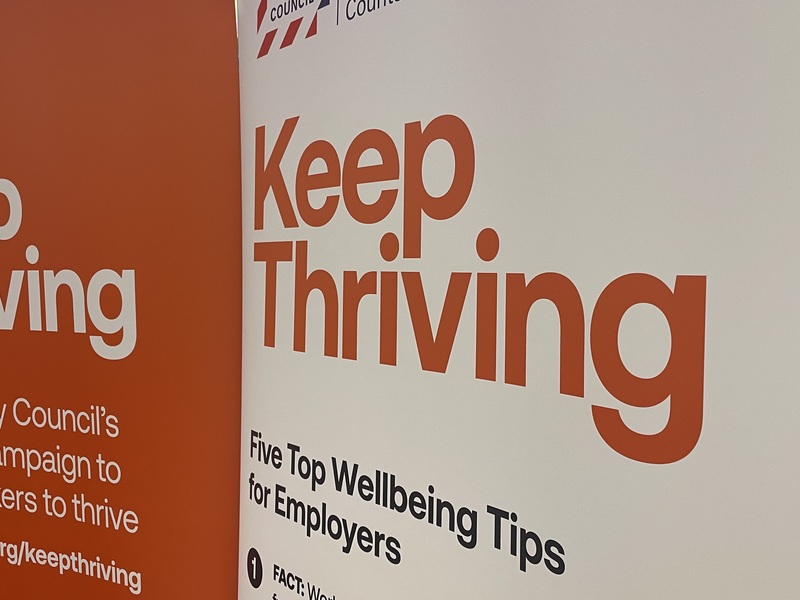British Safety Council Conference 2022
It was great to be back in person at the annual British Safety Council Conference, the topic for this year’s event: ‘Taking a holistic approach to health, safety and wellbeing’.
The event was Chaired by Lawrence Waterman OBE, Board Member at the British Safety Council with Mike Robinson, Chief Executive giving a stirring introduction. He really set the scene for the day, outlining the clear link between health, safety and wellbeing and the need to take a holistic approach to these elements being essential to making improvements in the space.
Peter McGettrick then followed with the Chairman’s address challenging the audience in asking them to reflect on the question throughout the day “Is taking the holistic approach better?”.
The audience were then treated to a talk from double gold medal winner Col. Dame Kelly Holmes. The inspirational talk examined her mental health challenges throughout her career. She identified that although there were amazing resources as an Olympic athlete to ensure the body was performing at its optimum, there was very little at the time regarding the mind and athletes’ mental health. There is a clear parallel here between this and how organisations often focus on physical safety rather than health and mental health.
For Kelly ‘Wellbeing is happiness’ and ‘being her authentic self’ led to a step change in her mental health. Again, taking the holistic view Kelly identified the clear link here between diversity and inclusion and mental health.
Peter Kelly was next to the stage, having 24 years with the HSE and now Head of Programme at Mates in Mind, Peter spoke with real authority on ‘The storm that is coming in mental health’. He highlighted we are coming out of a pandemic which has had major impacts on mental health, many of these undiscovered and are likely going into a recession. History might repeat itself as the same scenario happened with the Spanish Flu which led to a major decline in mental health.
The stats are scary, 12% increase globally in suicides, and the rate of self-reported work-related stress, depression or anxiety was 828,000 workers last year, accounting for 17.9 million working days lost.
Peter suggested it is critical that society now look at prevention rather than a cure. He also talked about the great work Mates in Mind are undertaking and the need when engaging the workforce to ‘Speak with real language, language people will understand’.
With 18 suicides a day in the UK alone and 2 of those from workers in the construction industry, this is urgent. As Peter said – the time to act is now.
The day then split into panel sessions with Nathan Baker, Chief Executive of the Institute of Occupational Medicine, chairing a Panel discussion on ‘The whole worker. What the latest scientific research means for you and your workplace’. Nathan started the session by pointing out that Romans knew about the risks from dust….2000 years ago! However, we are still tackling this issue and people are still dying from exposure. Indeed, Nathan pointed out that on average companies have 30 wellbeing programs – from fruit to yoga, however only 3% of these are taken up.
This highlights the challenge that a lot of the information is there across health, safety and wellbeing, so the real challenge is not gathering more information but improving the uptake.
Later in the day Stuart Hughes, Head of Health and Safety at Petronas Formula One Team gave an overview of his role and how this has evolved in such a fast-paced environment. It was great to hear the importance Principal & CEO Toto Wolff placed on a holistic approach to health, safety and wellbeing and identifying the impact this can have on performance. Stuart talked about their successful program of ‘see it, say it, fix it’ which they use across the whole organisation but of course so relevant for health and safety. Perhaps their approach is summarised with the ‘don’t blame the person, blame the problem’ approach. If a high-performance Formula 1 environment live by this, how could it help other organisations drive health, safety and wellbeing?
The day was capped off with a talk from Prof Tim Marsh focused on ‘Why a humanistic and holistic approach to wellbeing is a real win: win’. As always Tim’s talk gave some real and pragmatic tools the audience could use to engage their workforce and improve health, safety and wellbeing in their organisations.
It was great that Tim identified humour as a key to successfully establish and build relationships, to then be in a position to have health and safety discussions. He also discussed the ‘FI index’, which is something him and Jason Anker have developed and are using successfully with a range of organisations to identify the real motivations driving behaviour, which are always multi-faceted and holistic. Tim and Jason are working with a range of large organisations through Anker & Marsh, really helping these organisations identify and make major improvements across their health, safety and wellbeing performance.
James Irwin is a Director at Irwin and Colton, a specialist health, safety and sustainability recruitment consultancy.

-20.jpg)